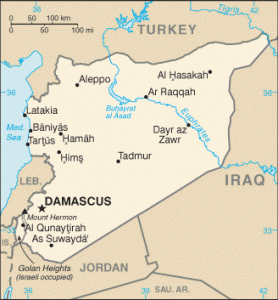Senator John Kerry (D-MA), who is the chairman of the Senate Foreign Relations Committee, has said the U.S. needs to step up its intervention in Syria, arguing for setting up “safe zones” and potentially arming and training the opposition.
 Kerry has so far stopped short of calling for coordinated military intervention, but said that his recent trip to Jordan, where he also spoke with Russian Foreign Minister Sergei Lavrov, changed his mind. He said it should be the policy of the U.S. to remove Syrian President Bashar al-Assad from power, but that it won’t happen “unless the on the ground calculations change.”
Kerry has so far stopped short of calling for coordinated military intervention, but said that his recent trip to Jordan, where he also spoke with Russian Foreign Minister Sergei Lavrov, changed his mind. He said it should be the policy of the U.S. to remove Syrian President Bashar al-Assad from power, but that it won’t happen “unless the on the ground calculations change.”
“The concept of a safe zone is a reality and worth the discussion. The concept of working with the Turks and the Jordanians, if everybody is on the same page, there could be some [military] training [of the opposition forces]. If we can enhance the unity of the opposition, we could consider lethal aid and those kinds of things,” Kerry said.
The Obama administration has already begun sending small amounts of what they call “non-lethal” aid to the opposition, but committing to Kerry’s prescriptions would be counterproductive to what he claims his goal is: to protect civilians.
So-called safe zones are simply not a viable option. “Humanitarian corridors,” explained Marc Lynch of George Washington University in testimony before a House Foreign Affairs subcommittee, “would be extremely difficult to protect, and could create a new refugee crisis if desperate civilians rush into designated safe zones or neighboring countries.”
Safe areas might also require airpower in some form, but Assad’s “anti-aircraft capabilities are located in or near urban areas, which means that significant civilian casualties could result from any attempt to eliminate them.” Lynch said. “Creating and protecting a safe area in Syria would therefore require a significant and lengthy investment of troops and resources, and would not likely hasten Assad’s collapse.”
Arming and/or training the opposition, as Kerry also advocates, could have even worse outcomes. It is unlikely that arms from the outside would come close to evening the balance of power, but it would invite escalations from Syrian regime forces.
Additionally, there are a number of Syrian activists pushing for liberal reforms who have begun a movement to return to unarmed, peaceful protests instead of armed revolt. These groups would be immediately marginalized if the U.S. and its allies decide to empower the fighting groups and extremists in the opposition through lethal aid.
All of the options for more active intervention are likely to result in the outbreak of a broader war and more suffering for the Syrian people. This has been admitted by several Obama administration officials. And just this week, in remarks to the Washington Institute of Near East Policy, Deputy National Security Advisor Denis McDonough said “we do not believe that intervention hastens the demise of the regime.”


